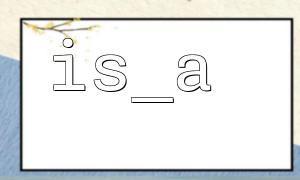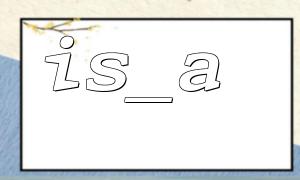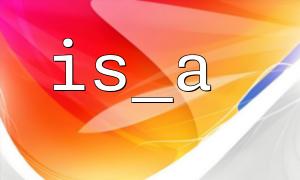When developing applications using the Laravel framework, we often rely on its powerful service containers for dependency injection. Laravel's dependency injection function not only improves the testability of the code, but also greatly improves maintainability. However, in some scenarios, we may need to judge the object type when parsing dependencies. At this time, the is_a() function is very useful.
The built-in function is_a() of PHP is used to determine whether an object is an instance of the specified class or a subclass of the class.
is_a(object|string $object_or_class, string $class, bool $allow_string = false): bool
Parameter description:
$object_or_class : The object or class name to be checked.
$class : Target class name.
$allow_string : Whether to allow the class name string (default false ).
Sometimes we need to register multiple implementation classes based on different interfaces or parent classes. For example, you might have multiple payment gateway services, all of which implement the same interface. At this time, using is_a() to determine the type when binding the service to the container allows you to more flexibly control which service to use.
Let's illustrate with an example of a payment gateway.
First define an interface PaymentGatewayInterface :
namespace App\Contracts;
interface PaymentGatewayInterface
{
public function charge(float $amount);
}
Next, define two implementation classes:
namespace App\Services;
use App\Contracts\PaymentGatewayInterface;
class StripeGateway implements PaymentGatewayInterface
{
public function charge(float $amount)
{
// Stripe logic
}
}
class PaypalGateway implements PaymentGatewayInterface
{
public function charge(float $amount)
{
// Paypal logic
}
}
In a service provider, we can dynamically bind based on whether the class belongs to a certain type:
namespace App\Providers;
use Illuminate\Support\ServiceProvider;
use App\Contracts\PaymentGatewayInterface;
use App\Services\StripeGateway;
use App\Services\PaypalGateway;
class AppServiceProvider extends ServiceProvider
{
public function register()
{
$this->app->bind(PaymentGatewayInterface::class, function ($app) {
$gateway = config('services.payment_gateway'); // Assume this configuration item is a class name string
if (is_a($gateway, PaymentGatewayInterface::class, true)) {
return new $gateway();
}
throw new \InvalidArgumentException("Invalid payment gateway type:{$gateway}");
});
}
}
Let's assume that the configuration file config/services.php is defined as follows:
return [
'payment_gateway' => \App\Services\StripeGateway::class,
];
This allows different implementation classes to be dynamically returned according to the configuration, and through is_a() , it is ensured that the returned class is in line with the expected type, avoiding runtime errors caused by incorrect configuration.
In the controller or service class, only the type prompt interface is required:
use App\Contracts\PaymentGatewayInterface;
class OrderController extends Controller
{
public function pay(PaymentGatewayInterface $gateway)
{
$gateway->charge(100);
}
}
Laravel will automatically inject the implementation classes defined in the configuration, and we have ensured type safety through is_a() .
is_a() is a simple but very practical tool function. Using it in Laravel's service container can enhance the security and flexibility of type judgment logic. Especially when it is necessary to decide on binding service instances based on configuration or runtime conditions, is_a() provides an elegant way to perform type validation.
In this way, it is possible to ensure that the services injected by the container meet the expected interface contract, thereby reducing runtime errors and improving application stability.













